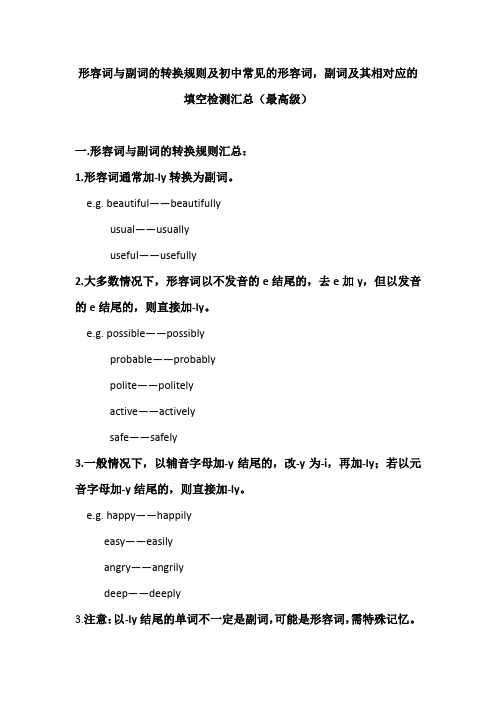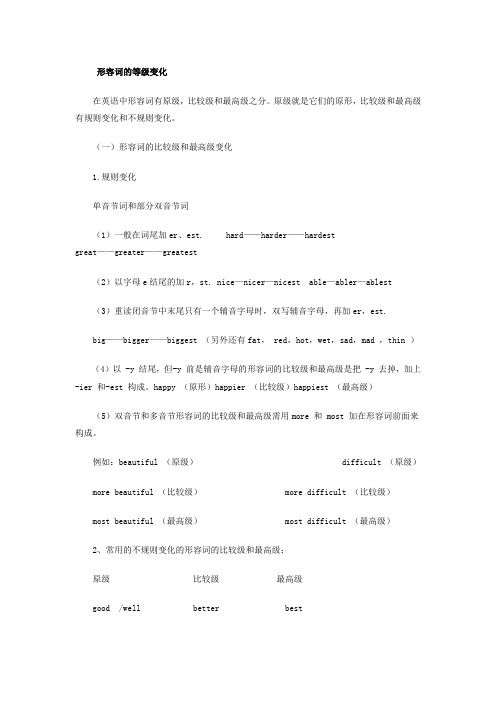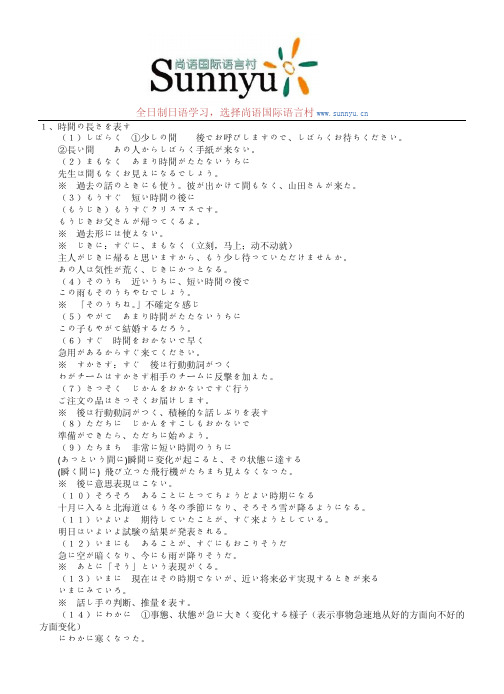E09AB105 副词[1]
初中形容词与副词的转换规则及常考的形容词,副词及其相对应的填空检测汇总(完整版)

形容词与副词的转换规则及初中常见的形容词,副词及其相对应的填空检测汇总(最高级)一.形容词与副词的转换规则汇总:1.形容词通常加-ly转换为副词。
e.g. beautiful——beautifullyusual——usuallyuseful——usefully2.大多数情况下,形容词以不发音的e结尾的,去e加y,但以发音的e结尾的,则直接加-ly。
e.g. possible——possiblyprobable——probablypolite——politelyactive——activelysafe——safely3.一般情况下,以辅音字母加-y结尾的,改-y为-i,再加-ly;若以元音字母加-y结尾的,则直接加-ly。
e.g. happy——happilyeasy——easilyangry——angrilydeep——deeply3.注意:以-ly结尾的单词不一定是副词,可能是形容词,需特殊记忆。
e.g. friendly友好的lovely可爱的lonely孤单的deadly致命的lively生机勃勃的likely可能的daily日常的,每日的weekly每周的yearly每年的4.有些词既可以作形容词也可以作副词(如hard),加了-ly之后意思发生改变(hardly),或许它本身就是副词(fast)。
e.g. hard work辛苦的工作(hard为形容词,修饰名词work)work hard工作努力(hard为副词,修饰动词work)hardly ever几乎不曾(hardly为副词,修饰副词ever)run fast跑得快(fast为副词,修饰动词fast)二.初中常考的形容词与副词相互转换词汇汇总:easy adj.简单的,容易的——easily adv.简单地,容易地exact adj.确切的——exactly adj.确切地actual adj.实际的——actually adv.实际上,事实上quick adj.快的——quickly adv.快地official adj.官方的,正式的,公务的——officially adv.官方地quiet adj.安静的——quietly adv.安静地terrible adj.糟糕的——terribly adv.糟糕地gradual adj.逐渐的——gradually adv.逐渐地especial adj.尤其的——especially adv.尤其special adj.特别的——specially adv.专门地final adj.最后的—— finally adv.最后heavy adj.重的——heavily adv.严重地,大地extreme adj.极度的——extremely adv.极度地active adj.积极的,活跃的——actively adv.积极地,活跃地selfless adj.无私的——selflessly adv.无私地regular adj.规则的,定期的,常规的—— regularly adv.定期地,常规地simple adj.简单的——simply adv.简单地real adj.真的——really adv.真地personal adj.私人的—— personally adv.私人地total adv.全部的,完全的—— totally adv.完全地happy adj.开心的——happily adv.开心地safe adj.安全的——safely adv.安全地obvious adj.明显的,显而易见的——obviously adv.明显地beautiful adj.美丽的——beautifully adv.漂亮地slight adj.轻微的,微小的——slightly adv.稍稍,轻微地fortunate adj.幸运的,吉利的——fortunately adv.不幸运的,不吉利unfortunate adj.不幸的,令人遗憾的——unfortunately adv.不幸运地deep adj.深的——deeply adv.深情地loud adj.大声的——loudly adv.大声地true adj.真实的,真正的——truly adv.真实地,真诚地,真正地convenient adj.方便的——conveniently adv.方便地usual adj.通常的,普遍的——usually adv.通常deliberate adj.故意的——deliberately adv.故意地tight adj.紧的——tightly adv.紧地firm adj.坚定的——firmly adv.坚定地ridiculous adj.荒谬的,可笑的——ridiculously adv.荒谬地,可笑地particular adj.尤其的,挑剔的——particularly adv.尤其,挑剔地normal adj.正常的—— normally adv.正常地precious adj.珍贵的——preciously adv.珍贵地anxious adj.焦虑的——anxiously adv.焦虑地absolute adj.绝对的,完全的——absolutely adv.绝对地,完全地conscious adj.有意识的——consciously adv.有意识地excellent adj.优异的,卓越的——excellently adv.卓越地annual adj.每年的,年度的——annually adv.年度地,每年地comfortable adj. 舒适的——comfortably adv.舒适地fair adj.公平的——fairly adv.公平地,相当地short adj.短的,缺少的——shortly adv.不久practical adj.实用的——practically adv.实用地三.初中常考的形容词与副词的相互转换词汇填空检测汇总:easy adj.简单的,容易的——____________adv.简单地,容易地exact adj.确切的——____________adj.确切地actual adj.实际的——____________adv.实际上,事实上quick adj.快的——____________adv.快地official adj.官方的,正式的,公务的——____________adv.官方地quiet adj.安静的——____________adv.安静地terrible adj.糟糕的——____________adv.糟糕地gradual adj.逐渐的——____________adv.逐渐地especial adj.尤其的——____________adv.尤其special adj.特别的——____________adv.专门地final adj.最后的——____________adv.最后heavy adj.重的——____________adv.严重地,大地extreme adj.极度的——____________adv.极度地active adj.积极的,活跃的——____________adv.积极地,活跃地selfless adj.无私的——____________adv.无私地regular adj.规则的,定期的,常规的——____________adv.定期地,常规地simple adj.简单的——____________adv.简单地real adj.真的——____________adv.真地personal adj.私人的——____________adv.私人地total adv.全部的,完全的——____________adv.完全地happy adj.开心的——____________adv.开心地safe adj.安全的——____________adv.安全地obvious adj.明显的,显而易见的——____________adv.明显地beautiful adj.美丽的——____________adv.漂亮地slight adj.轻微的,微小的——____________adv.稍稍,轻微地fortunate adj.幸运的,吉利的——_________ adj.不幸运的,不吉利的unfortunate adj.不幸的,令人遗憾的——____________adv.不幸运地deep adj.深的——____________adv.深情地loud adj.大声的——____________adv.大声地true adj.真实的,真正的——__________adv.真实地;真诚地;真正地_________adj.方便的——__________adv.方便地usual adj.通常的,普遍的——____________adv.通常deliberate adj.故意的——____________adv.故意地tight adj.紧的——____________adv.紧地firm adj.坚定的——____________adv.坚定地ridiculous adj.荒谬的,可笑的——____________adv.荒谬地,可笑地particular adj.尤其的,挑剔的——____________adv.尤其,挑剔地normal adj.正常的——____________adv.正常地precious adj.珍贵的——____________adv.珍贵地anxious adj.焦虑的——____________adv.焦虑地absolute adj.绝对的,完全的——____________adv.绝对地,完全地conscious adj.有意识的——_________adv.有意识地excellent adj.优异的,卓越的——____________adv.卓越地annual adj.每年的,年度的——____________adv.年度地,每年地comfortable adj.舒适的——____________adv.舒适地fair adj.公平的——____________adv.公平地,相当地short adj.短的,缺少的——____________adv.不久practical adj.实用的——____________adv.实用地。
高中英语高考语法知识讲解(副词的构成+倍数的表达方法)

高考英语语法知识讲解一、副词的构成01 本身即为副词如there(那里),now(现在),quite(非常),rather(相当)等。
02 形容词+-ly构成的副词(1)一般情况,直接加-ly,如:abrupt-abruptly(突然地)brave-bravely(勇敢地)immediate-immediately(立即)safe-safely(安全地)careful-carefully(仔细地)real-really(确实,的确;真正地)(2)以辅音字母+y结尾,将y改为i再加-ly,如:busy-busily(忙碌地)easy-easily(容易地)happy-happily(高兴地)heavy-heavily(沉重地;很大程度上)注意:shy-shyly(害羞地)dry-drily/dryly(干燥地;冷冰冰地)(3)以-le结尾,去e加-y,如:able-ably(能干地)comfortable-comfortably(舒适地)gentle-gently(温和地)possible-possibly(可能)probable-probably(可能)simple-simply(仅仅;简单地)stable-stably(稳定地)terrible-terribly(非常,很)unbelievable-unbelievably(令人难以置信地)注意:whole-wholly(完全,整体地)(4)以元音字母+e结尾,去e加-ly,如:true-truly(真正地)(5)以-ll结尾,只加-y,如:full-fully(完全地)dull-dully(枯燥无味地)(6)以-ic结尾,加-ally,如:basic-basically(基本上;总得来说)energetic-energetically(精力充沛地)automatic-automatically(自动地)optimistic-optimistically(乐观地)pessimistic-pessimistically(悲观地)scientific-scientifically(科学上,关于科学)[注]注意一些以-ly结尾的词有时是形容词或兼具多个词性。
形容词副词比较等级知识点总结

形容词的等级变化在英语中形容词有原级,比较级和最高级之分。
原级就是它们的原形,比较级和最高级有规则变化和不规则变化。
(一)形容词的比较级和最高级变化1.规则变化单音节词和部分双音节词(1)一般在词尾加er、est. hard——harder——hardest great——greater——greatest(2)以字母e结尾的加r,st. nice—nicer—nicest able—abler—ablest(3)重读闭音节中末尾只有一个辅音字母时,双写辅音字母,再加er,est.big——bigger——biggest (另外还有fat, red,hot,wet,sad,mad ,thin )(4)以 -y 结尾,但-y 前是辅音字母的形容词的比较级和最高级是把 -y 去掉,加上-ier 和-est 构成。
happy (原形)happier (比较级)happiest (最高级)(5)双音节和多音节形容词的比较级和最高级需用more 和 most 加在形容词前面来构成。
例如:beautiful (原级) difficult (原级)more beautiful (比较级) more difficult (比较级)most beautiful (最高级) most difficult (最高级)2、常用的不规则变化的形容词的比较级和最高级:原级比较级最高级good /well better bestmany/much more mostbad /badly worse worstlittle less leastill worse worstfar farther(further) farthest(furthest)三、形容词比较等级的用法:1、形容词的比较级用于两个人或事物的比较,其结构形式如下:主语+谓语(系动词)+ 形容词比较级+than+ 对比成分。
例如:Our teacher is taller than we are. 我们老师的个子比我们的高。
英语学习:副词的解析和用法

英语学习:副词的解析和用法什么是副词:副词(adverb)修饰动词、形容词和其他副词等,说明时间、地点、程度、方式等概念。
如:often往往,here这里,very很,quickly很快地。
副词的构成:1)本身就是副词,如now现在,there那里,rather颇。
2)由形容词加词尾-1y变来,如firmly坚决地,happi1y幸福地。
3)与形容词同形early adj. 早的 early adv. 早high adj. 高的 high adv. 高高地long adj. 长的,长久的long adv. 长久地副词的种类:副词可分为下列几种:1)普通副词(ordinary adverb)如:together一起,well好,seriously认真地,slowly 慢,carefully小心地。
2)疑问副词(interrogative adverb)如:when何时,where何地,how如何,why为何。
3)关系副词(relative adverb)如:where,when。
4)连接副词(conjunctive adverb)如:then然后,there{ore所以,however然而,hence 所以,thus这样,nevertheless然而,otherwise否则,still可是,仍然。
副词的用法副词在句中可用作:1)状语(这是副词在句子中的主要功用)It is raining hard.雨下得很大。
(副词hard作状语,修饰动词is raining。
)Don't drive too fast.车子不要开得太快。
(fast是副词,作状语,修饰动词drive,副词too又修饰副词fast。
)He speaks English quite well.他英语讲得相当好。
(well修饰动词speaks,quite 又修饰副词well。
)He has always helped his sister with her homework.他一向帮助他妹妹做家庭作业。
英语语法_副词

英语语法-副词(Adverb) 副词的定义: 副词是一种用来修饰动词,形容词,副词或全句的词,说明时间,地点,程度,方式等概念。
副词的分类: 1) 时间和频度副词: now,then,often,always,usually,early,today, lately, next,last,already,generally,frequently, seldom,ever,never,yet,soon,too, immediately, hardly,finally,shortly, before, ago,sometimes, yesterday. 2) 地点副词: here, there, everywhere, anywhere, in, out, inside, outside, above, below, down, back, forward, home, upstairs, downstairs, across, along, round , around, near, off, past, up, away, on.3) 方式副词: carefully, properly, anxiously, suddenly, normally, fast, well, calmly, politely, proudly, softly, warmly 4) 程度副词: much,little, very,rather,so,too,still, quite, perfectly, enough, extremely, entirely,almost, slightly.5) 疑问副词: how, when, where, why.6) 关系副词: when, where, why.7) 连接副词: how, when, where, why, whether. 副词的用法: 副词在句中可作状语,表语,短语。
日语副词总结

全日制日语学习,选择尚语国际语言村1、時間の長さを表す(1)しばらく①少しの間後でお呼びしますので、しばらくお待ちください。
②長い間あの人からしばらく手紙が来ない。
(2)まもなくあまり時間がたたないうちに先生は間もなくお見えになるでしょう。
※過去の話のときにも使う。
彼が出かけて間もなく、山田さんが来た。
(3)もうすぐ短い時間の後に(もうじき)もうすぐクリスマスです。
もうじきお父さんが帰ってくるよ。
※過去形には使えない。
※じきに:すぐに、まもなく(立刻,马上;动不动就)主人がじきに帰ると思いますから、もう少し待っていただけませんか。
あの人は気性が荒く、じきにかっとなる。
(4)そのうち近いうちに、短い時間の後でこの雨もそのうちやむでしょう。
※「そのうちね。
」不確定な感じ(5)やがてあまり時間がたたないうちにこの子もやがて結婚するだろう。
(6)すぐ時間をおかないで早く急用があるからすぐ来てください。
※すかさず:すぐ後は行動動詞がつくわがチームはすかさず相手のチームに反撃を加えた。
(7)さっそくじかんをおかないですぐ行うご注文の品はさっそくお届けします。
※後は行動動詞がつく、積極的な話しぶりを表す(8)ただちにじかんをすこしもおかないで準備ができたら、ただちに始めよう。
(9)たちまち非常に短い時間のうちに(あっという間に)瞬間に変化が起こると、その状態に達する(瞬く間に) 飛び立った飛行機がたちまち見えなくなった。
※後に意思表現はこない。
(10)そろそろあることにとってちょうどよい時期になる十月に入ると北海道はもう冬の季節になり、そろそろ雪が降るようになる。
(11)いよいよ期待していたことが、すぐ来ようとしている。
明日はいよいよ試験の結果が発表される。
(12)いまにもあることが、すぐにもおこりそうだ急に空が暗くなり、今にも雨が降りそうだ。
※あとに「そう」という表現がくる。
(13)いまに現在はその時期でないが、近い将来必ず実現するときが来るいまにみていろ。
2021届巴蜀中学新高考英语语法基础复习讲义副词、副词词组解读(含总目录)
2021届巴蜀中学新高考英语语法基础复习讲义[21]副词和负此次组解读(总目录见文末)什么是副词?副词是常见的一种词性;英文名称是adverb,在字典上通常对应的缩写是adv.或ADV。
副词修饰动词——这是副词最基本的用法,必须要牢记。
例如:run fast(跑得快,快速地跑)副词fast(快地)修饰动词run(跑)also like(也喜欢)副词also(也)修饰动词like(喜欢)read aloud(朗读,出声地读)副词aloud(出声地)修饰动词read(读)Edward runs fast.爱德华跑得快。
I also like walking in the rain.我也喜欢在雨中散步。
Would you like to read the poem aloud for us?你愿意为我们朗读这首诗吗?通过以上例子可以发现,副词不一定总是紧跟在它修饰的动词之后,有时会出现在该动词之前,有时还会与该动词被隔开。
甚至在一些长难句中,副词与其修饰的动词之间可能会相距甚远。
当然,有时候使用副词不单单是为了修饰某个动词,还可能对整句话起到修饰作用。
例如:Actually, it is not that bad.事实上,它没有那么糟糕。
最后一点需要说明的是,副词与其它主要词性一样,从广义的角度看,它是一种功能,不仅单词可以有,词组、短语乃至分句都可以发挥出副词的功能,去修饰某个动词或是整句话。
例如:下列句中的划线部分都在句中发挥出了副词功能I go home.我回家。
(副词home作状语,修饰动词go。
)I go to school.我去上学。
(介词词组to school作状语,修饰动词go。
)Wounded in the war, he forgot his own name.他在战争中受了伤,忘记了自己的名字。
(过去分词短语作状语,修饰句子主干,即未划线部分。
)Aiming to improve her English, she reads an English novel every month.为了提高她的英语水平,她每个月都读一本英语小说。
高一英语形容词变副词的一般规则
形容词变副词的一般规则形容词变副词通常是加ly,其变化有规律可循,请记住以下口诀:一般直接加,“元e”去e加,“辅y”改i加,“le”结尾e改y。
具体规则如下:1.一般情况下直接加“ly”,如:quick-quickly;polite-politely;sad-sadly;imediate-immediately; recent-recently2.少数以e结尾的形容词,要去掉e再加-ly。
如:true-truly; due-duly 绝大多数辅音字母加e结尾的形容词直接加-ly。
如:polite-politely;wide-widely;wise-wisely;nice-nicely3.以“y”结尾的,且读音为/ i /,先将“y”改成“i”,再加“ly”,如:happy-happily;heavy-heavily;angry-angrily;busy-busily4.以ic结尾的词,加ally,如:economic-economically;basic-basically;scientific-scientifically; automatic-automatically; energetic-energetically; 但是public-publicly例外。
5.以辅音字母加le结尾时,去e加y,如:simple-simply;considerable-considerably;terrible-terriblygentle-gently;possible-possibly;probable-probably;incredible-incredibly6.以-ll结尾时,只须加–y,如:dull-dully;shrill-shrilly需注意:有些以ly结尾的词是形容词而非副词。
如:friendly people;motherly care;lovely dog;monthly exam;heavenly peace;a manly sport分类:1.时间副词Now, then, today, tomorrow, yesterday, before, ago, soon, early, lately 等.时态标志2.地点副词Outside, inside, upstairs, here, there, home, near, away, in, back,up,anywhere等. 注:地点副词和动词连用时不加介词。
汉语词性对照表
数词
取英语 numeral的第3个字母,n,u已有他用。
Ng
名语素
名词性语素。名词代码为 n,语素代码g前面置以N。
n
名词
取英语名词 noun的第1个字母。
nr
人名
名词代码 n和“人(ren)”的声母并在一起。
ns
地名
名词代码 n和处所词代码s并在一起。
nt
机构团体
“团”的声母为 t,名词代码n和t并在一起。
e
叹词
取英语叹词 exclamation的第1个字母。
f
方位词
取汉字“方”
g
语素
绝大多数语素都能作为合成词的“词根”,取汉字“根”的声母。
h
前接成分
取英语 head的第1个字母。
i
成语
取英语成语 idiom的第1个字母。
j
简称略语
取汉字“简”的声母。
k
后接成分
l
习用语
习用语尚未成为成语,有点“临时性”,取“临”的声母。
nz
其他专名
“专”的声母的第 1个字母为z,名词代码n和z并在一起。
o
拟声词
取英语拟声词 onomatopoeia的第1个字母。
p
介词
取英语介词 prepositional的第1个字母。
q
量词
取英语 quantity的第1个字母。
r
代词
取英语代词 pronoun的第2个字母,因p已用于介词。
s
处所词
取英语 space的第1个字母。
tg
时语素
时间词性语素。时间词代码为 t,在语素的代码g前面置以T。
t
时间词
取英语 time的第1个字母。
副词详细讲解课件
四、副词构成
(1)一般是在形容词之直接加-ly:
really sad______; sadly certain_______; certainly real______;
(2) 形容词以辅音字母结尾加y 结尾的变y为i, 再加 -ly:
hungrily ; angry______; angrily easy_______ easily hungry_____
副词 Adverb
一、定义
副词(Adverb 简称adv.)是指在 句子中表示行为或状态特征的词, 用以修饰动词、形容词、其他副 词或全句,表示时间、地点、程 度、方式等概念。副词可分为: 时间副词、地点副词、频率副词、 方式副词、程度副词、疑问副词、 连接副词、关系副词。
二、分类
1)时间副词, 常用的有:ago,before, then, soon, already,yet等 2)地点副词, 常用的有:here,there,above, below,inside,outside 3)疑问副词, 常见的有: where,when,why, how 4)程度副词,常见的有:very,much,so,too, quite,enough 5)方式副词,多由形容后加ly构成: carefully, quickly,slowly, easily,quietly,hurriedly, 6)频度副词, 常用的有:always,often,sometimes. usually, hardlywhen, why
This is the village where I was born. Is that the reason why you don’t take the exam?
1、主要用作状语,可用来修饰动词,形容词,副词和句子。 1.动词
- 1、下载文档前请自行甄别文档内容的完整性,平台不提供额外的编辑、内容补充、找答案等附加服务。
- 2、"仅部分预览"的文档,不可在线预览部分如存在完整性等问题,可反馈申请退款(可完整预览的文档不适用该条件!)。
- 3、如文档侵犯您的权益,请联系客服反馈,我们会尽快为您处理(人工客服工作时间:9:00-18:30)。
副词Name:______ Date:_______【美文欣赏】Life生命By Langston Hughes——兰斯顿,休斯Life can be good, 生命或许美好,Life can be bad, 亦或充满荆棘,Life is mostly cheerful, 生命大部分是快乐的,But sometimes sad. 但有时也会有悲伤.Life can be dreams 生命或充满了梦想,Life can be great thoughts; 亦或是伟大的思考;Life can mean a person, 生命就是坐于法庭,Sitting in court, 等待着时间的宣判.Life can be dirty, 生命或许污浊,Life can even be painful; 甚或倍感痛苦;But life is what you make it, 但生命由自己创造,So try to make it beautiful. 所以努力使其美丽吧!【内容解读】1.副词的基本功能及其在句子中的位置2.副词的比较等级的构成和用法【能力解读】1.掌握英语中形容词、副词的语法特点及他们之间的语义差异。
2.在交际情景中正确运用副词比较等级的用法。
3.准确辨析一些常用同义副词。
【06年全国中考题组】1. Health is very important to us. We should eat more vegetables and fruit instead ofrich food..A. too muchB. much tooC. very much2. -is “Lucky52” shown on CCTY-2?-Every week.A. How oftenB. How longC. How soonD. How many times3. -This box is heavy for me to carry. Can you help me?-Certainly.A. soB. muchC. veryD. too4. -I hate vegetables. I eat them.-But they’re good for your health! Y ou should often eat them.A. seldomB. oftenC. usuallyD. always5. I followed him to see he was going, and I was very surprised when he went into the policestation.A. howB. whereC. whyD. whether6. People in different countries behave when they eat dinner.A. politelyB. differentlyC. healthilyD. quietly7. Though he has studied at Russian for ten months, he can still speak the language.A. hard, hardB. hardly, hardlyC. hard, hardlyD. hardly, hard8. -I haven’t been to the aquarium before. How about you, Tom?-Me .A. tooB. eitherC. neither9. Peter was tired that he couldn’t continue running.A. veryB. tooC. so10. It is nice of you to say so.A. trulyB. trueC. reallyD. real11. -Could you tell me to have the picnic?-Near the South Beach.A. whatB. whyC. whenD. where12. I had much homework last night, so I went to bed .A. earlyB. lateC. soonD. slow13. -Which of the twins sings .-They are neck and neck, I think.A. wellB. betterC. bestD. the best14. -will you be away?-In a couple of weeks.A. What timeB. How soonC. How oftenD. How long15. -After meeting my friend at the airport, I drove her to the hotel.A. clearlyB. directlyC. luckilyD. exactly16. Though the famous dancer Tai Lihua is deaf, she dances most of the people.A. as good asB. as well asC. best amongD. better than17. -Y ou borrowed some money from me last year, Mr Green.-Did I? ? Did you lend me?A. How manyB. How longC. How muchD. How soon18. They all looked at the teacher when he told them the good news.A. sadlyB. happilyC. carefullyD. angrily19. -Can you tell me it is from here to the Summer Palace?-Let me see. It’s about 15 minutes’ ride.A. how longB. how soonC. how muchD. how far20. -Excuse me. is the park?A. how longB. how soonC. HowD. Where-It’s on the Center Street.A. WhatB. WhichC. HowD. Where21. -Where would you like to go on vacation?-I’d love to go .A. somewhere relaxingB. anywhere relaxedC. somewhere relaxedD. everywhere relaxing22. -do you like the film?-V ery interesting.A. HowB. WhoC. WhatD. When23. Which do you like , apples or oranges?A. bestB. goodC. wellD. better24. -Y ou are standing to near too near to the TV. Can you move a bit ?-OK, Mum. Is it all right here?A. fasterB. slowerC. fartherD. nearer25. Will you please drive ? The train is leaving soon.A. quickB. fasterC. slowlyD. more slowly26. -Can you understand me?-Sorry, I can understand what you have said.A. hardlyB. almostC. nearlyD. easily27. Mary runs of all the girls in her school and she won the 100-metre race last month.A. fastestB. slowestC. nearestD. highest28. Don’t worry. She can look after your pet .A. careful enoughB. enough carefulC. carefully enoughD. enough carefully29. -How do you like the film we saw yesterday?-The thing I like of all about it is the music.A. betterB. wellC. the betterD. best30. We are glad to see our hometown is developing these years than ever before.A. less quicklyB. more quicklyC. most quickly【02-05年全国中考题组】1. -How does Bill drive now, Sue?-He drives me.A. much more careful thanB. as careful asC. even more carefully thanD. as more carefully as2. -What was the weather like yesterday?-It was terrible. It rained so that people could go out.A. hardly…hardB. hardly…hardlyC. hard…hardlyD. hard…hard3. Look! The boy isn’t working so as that girl.A. hardB. harderC. hardestD. hardly4. -do you think of our city?-It’s very beautiful.A. WhenB. WhereC. HowD. What5. If you don’t want to go swimming. I won’t.A. tooB. alsoC. eitherD. neither6. This maths problem is and I can do it .A. easy; easilyB. easily; easilyC. easy; easyD. easily; easy7. Wang Ping does in physics of all the subjects.A. badlyB. most badlyC. worseD. worst8. Of all the students, Linda draws carefully.A. veryB. muchC. moreD. most9. Travelling by air may be , but not so .A. quicker; cheaperB. more quickly; cheapC. quicker; cheapD. more quickly; cheaper10. -Hi, Bob! I can’t find my history book. Have you seen it ?-Sorry, I haven’t. Why don’t you ask Jim? Perhaps he’s seen it.A. somewhereB. everywhereC. nowhereD. anywhere11. -What do you think of the football match?-Wonderful! The Chinese football team has never played .A. betterB. bestC. worseD. worst12. Put on more clothes. It is snowing outside.A. strongB. heavyC. stronglyD. heavily13. Don’t worry, sir. I’m sure I can run to catch up with them.A. fast enoughB. enough fastC. slowly enoughD. enough slowly14. -will you stay in America?-About two months.A. How manyB. How oftenC. How long15. Y ou’d better stay at home. The wind is blowing at the moment.A. hardlyB. strongC. strongly16. Walk , or we’ll be late for the meeting.A. slowlyB. slowC. quicklyD. quick17. -is it from here to No.1 Middle School?-About half an hour’s walk. Let’s go and visit it.A. How longB. How oftenC. How farD. How much18. -Which of the twins runs ?-It’s hard to say. They are neck and neck now.A. fastB. fasterC. fastestD. the fastest19. Our monitor takes more exercise every day, for he believes he does,he’ll be.A. the less; the strongerB. the more; the thinnerC. the more; the strongerD. more; stronger20. Guo Y ue did quite at the World Table Tennis Championship(锦标赛), but Zhang Y ining dideven .A. better; wellB. well; wellC. well; betterD. better; better【命题趋势】1.近五年中考对副词的考查重点在副词的比较级与最高级,副词与动词构成的固定搭配或习惯用法,形容词与副词词义辨析等。
